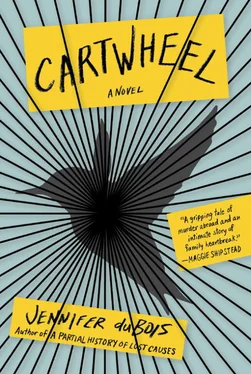Javier’s face softened a bit, and he said, “Well, I’m sorry, Lily. But I know you don’t actually need this job.”
“I’ve never been fired before.”
“Have you ever worked before?”
At this, shamefully, Lily’s eyes filled with tears. Why did everybody always want to think the worst of her? “Of course,” she said emphatically, and waited a moment to see if this might earn her a reprieve. When she saw it wasn’t going to, she told Javier she’d go clean out her locker.
A few minutes later, armed with her water bottle, book, and street shoes, Lily walked out into the already diminishing day. The rain had stopped. She really never had been fired before; it had been years and years, in fact, since she’d been in any kind of trouble at all, if you didn’t count Beatriz’s scoldings. She was still shaky from the conversation’s blunt smash of adrenaline—so much like the brief narcotizing energy that comes, when you’re hurt, just fractionally earlier than pain.
“Hey.”
Lily turned. It was Ignacio the Tortoise, leaning up against the side of a dumpster. Lily flashed to the image she’d seen—or thought she’d seen—of Ignacio and Katy, his hands on her ass, flashing in the strobe lights. Lily had wanted to ask Katy about it last night, but she’d been so drunk that she couldn’t be certain, and now that she and Katy had finally fought and reached a delicate, tentative peace, she wasn’t sure she’d want to reopen the issue.
“Hey,” said Lily. “I just got fired.”
Ignacio shook his head. “Bad luck,” he said. Lily could smell the pungent stink of weed. He must have just been smoking.
“I guess. Hey.” Lily felt suddenly bold. She was already a derelict employee—she might as well be a minor criminal, too. “Can I buy any of that from you?”
Ignacio raised his eyebrows in an expression of amusement. “Of course,” he said. “You want a baggie?”
“Um, I guess so.”
Ignacio began reaching into his backpack.
“Oh, now?” said Lily.
Ignacio looked around the empty alleyway. “You want to do it later?”
“No, no,” said Lily. “Now is great.”
Ignacio nodded and produced a small plastic bag with a few black rosettes in it. “For you, forty pesos,” he said. Lily was hoping he would hurry. “A discount. Since you’ve had a rough day.”
Lily found a damp fifty-peso bill in her purse, then handed it to Ignacio and grabbed the baggie. Sweat was breaking out on her back, and she scurried away from him without taking any of the change. “Thanks,” she called behind her, as she walked out of the alleyway and into the street.
“Hey,” said Ignacio. “Anytime.”
Lily turned onto the street and immediately nearly ran into a woman with an army of tiny dogs trotting alongside her. The dogs were so small that their heads bobbed savagely at the pace they were going; the smallest dog’s eyes were white with cataracts that shone like mother-of-pearl.
“Permiso,” Lily muttered. The woman gave her a look and walked away.
Lily would not tell Sebastien about the firing, she decided, as she headed toward the Subte. She would not tell Sebastien, or Katy, or Beatriz, or anyone. She could not bear to. And anyway, she could probably find a use for the freedom of nights with nowhere to go and no one to answer to. Lily’s awareness of the baggie in her purse was contracting and relenting like a pulse. She had nothing in mind, particularly; no plans or schemes or mischief or, beyond Katy and Sebastien, really any friends. But whatever you did was simply more your own when no one else knew you were doing it. In front of Lily, a scarp of periwinkle dusk was falling over the streets. Around her, the bars were just beginning to rouse to life. And out in the city she might find anything, anything at all, except someone who was waiting for her.
· · ·
Lily was careful to stay out of the house until her usual hour. When she returned, she found Katy in the living room, watching cartoons. Lily halted at the door and considered turning around—but then she’d be out later than Beatriz expected her to be, and she didn’t want to risk that. Instead, she paused in front of the living room.
“Hey,” she said. “What are you watching?”
“I don’t know,” said Katy. Next to her sat an economics textbook with an uncapped pen as a bookmark. “It’s totally surreal. I turned it on like an hour ago and I can’t turn away. How was work?”
Lily had been anxious about seeing Katy and had expected to feel something moving gingerly between them now, but Katy sounded nonchalant.
“Fine,” said Lily. “You know.” On the screen, a talking rodent with crazed eyes was doing somersaults. “This is a weird show.”
“Yeah. It kind of makes me wonder why I ever stopped watching cartoons. I guess because I went to middle school.”
“Age is really no object.” Lily walked over to the sofa, still holding her purse. She didn’t want to leave it unattended in the house—Beatriz probably had drug-sniffing dogs in her employ. “A lot of my friends watch them all the time.”
“Like, currently?”
“Yeah.”
“Why?”
“I don’t know,” said Lily, sitting down. “They think it’s hilarious.”
“Our generation has such a weird thing with little-kid stuff,” said Katy after a moment.
“What do you mean?”
“Like coloring books and ironic T-shirts with dinosaurs and stuff”
“I guess. It’s premature nostalgia.”
“Do you ever feel that way, though?”
“What way?”
“Like you could go back to some time that’s passed? Like you catch yourself thinking, why don’t I go there anymore, and why don’t I see those people and attend those parties, and then you remember it’s because that life is gone? And that you can’t?”
Lily nodded, even though she wasn’t sure she ever did feel that way, exactly. Under the regime of Maureen and Andrew, there had been no confusion about which way life was headed, or what its ultimate destination would be. Still, Lily had never heard Katy say anything like this before, and she wanted to offer something in return.
“Maybe it’s because when we’re kids we don’t really believe time only moves forward,” she said. “And then you learn it does, but you never really get your head around it.”
“You think that’s it?” said Katy.
“Yeah.” The red muskrat bopped manically on the screen. “Maybe.” It sounded like it could be true, and so maybe it was. After all, you hadn’t told a child a story until you had retold a child that story; children awoke to sentience in their lives with fables and fairy tales already familiar, and maybe this meant that the first stories they heard never felt like linear narratives at all—maybe they were more like rituals, passion plays, establishing a sense of life as recurrent and recursive, a sense that everything that happens is somehow always happening. “Like you know how when you’re a little kid you really think you live in a story?” said Lily.
“I don’t know,” said Katy doubtfully. “I don’t think so.”
“Oh, man,” said Lily. “I really, really felt that way. I totally thought I lived in a story. I was really pretty confused about it, actually. I was always thinking, here’s the part where this happens.”
“Where what happens?”
“Well, like.” Lily thought for a moment. “Like this time that my parents got a man to dress up as Winnie-the-Pooh and show up on the porch for my fifth birthday, for example.”
“That sounds terrifying.”
“It wasn’t, though! That’s the thing—I wasn’t terrified at all. I think I’d seen so many movies about ordinary children’s lives turning magical that I saw it as basically my birthright.” It was true: Lily remembered it vividly. When she’d seen Pooh coming up the walkway, she’d clasped her hands together in a gesture of such hushed, old lady-ish happiness that Andrew and Maureen had laughed and taken her picture. “Who’s that?” Maureen had said, her voice suspiciously girlish, the way it always was when she was telling children lies—it was a tone that Lily had half-noticed even then, though she’d merely registered it as the voice that Maureen used when something incredibly special was happening. But what Maureen and Andrew hadn’t known—what they never had known—was that Lily was not actually surprised. She wasn’t surprised at all. In that picture, what she was thinking was: This is it. It’s finally happening. This is the part where the magic starts.
Читать дальше












